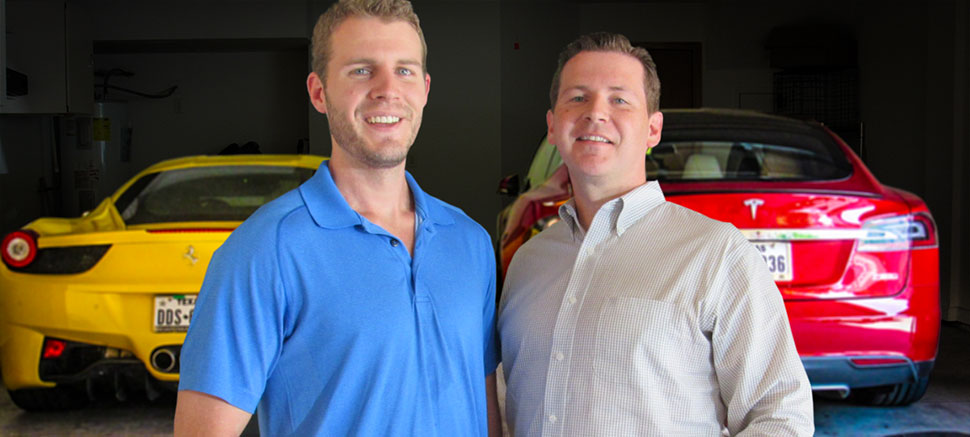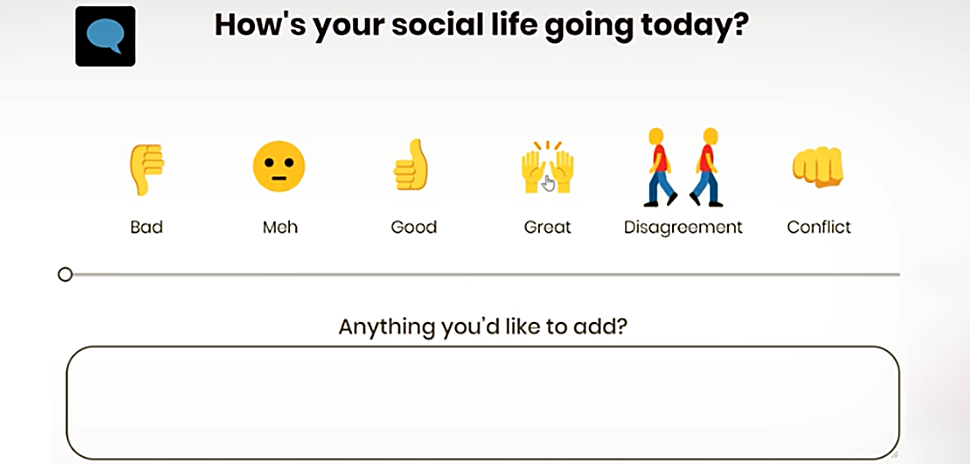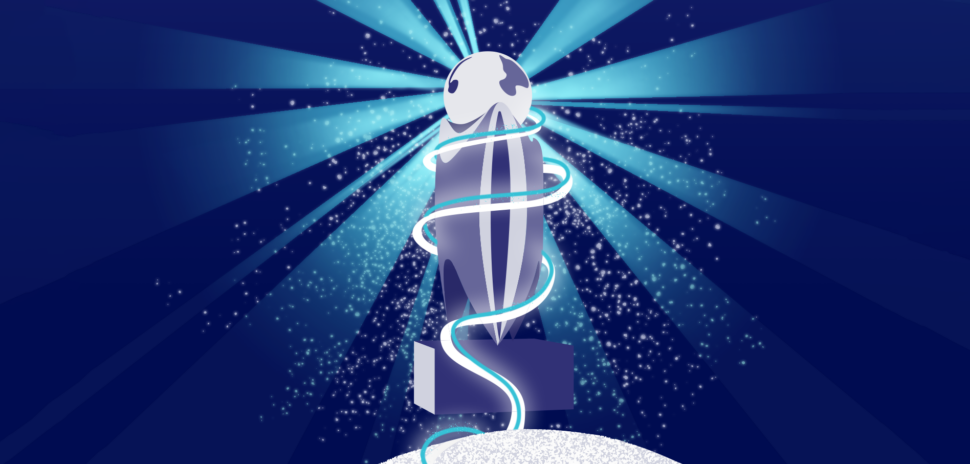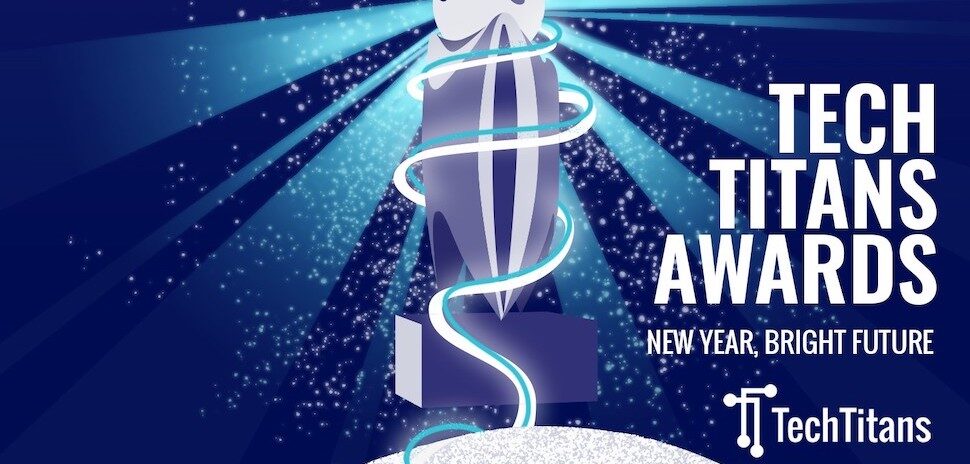Matt Hinson, founder and CEO of Dallas-based Rollout, is in the middle of describing his construction drawing management software, when suddenly he stops short.
“Whoa,” Hinson exclaims after his arms flail backward and eyes instinctively squeeze shut.
It’s the kind of reaction Touch Titans CEO Kirk Ballou was hoping for as he randomly launched his Tesla to 60 mph in a matter of seconds.
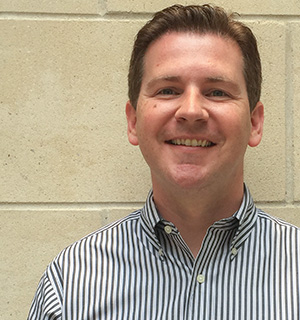
Kirk Ballou
After seeing other Tesla reaction videos on YouTube, Ballou thought it’d be fun to subject Dallas-Fort Worth-area entrepreneurs to a sudden acceleration while pitching their companies.
The videos haven’t racked up millions of views like the DragTimes ones, but Ballou’s purpose lies in giving startups a platform to share their stories.
“The driving factor for it is hopefully someone will see these startups that wouldn’t have otherwise. To me, that’s a win,” Ballou said.
So far, entrepreneurs that have taken on the challenge include Marshall Culpepper of Denton-based Kubos, Andre Nakkurt formerly of Dallas-based Vinli, and The Dallas Entrepreneur Center co-founder Trey Bowles. The latest video features Alex Becker of Market Hero and Source Wave. Dallas Innovates’ Media Development Manager Courtney Garza went along on the ride.
Ballou took some time recently to talk to Dallas Innovates about the pitch videos, his company, Touch Titans, and the Dallas startup community.
What inspired you to start the pitch videos with the Tesla?
There’s a guy out of Florida that has DragTimes, their YouTube channel, which had millions of views on these Tesla reaction videos, but there was no real purpose. It was just people freaking out from the car launching.
Last year, during South by Southwest [SXSW], they were subjecting startups to pitching while eating jalapeños — like really hot, habanero jalapeños. I was like, ‘that would be a stressful situation to pitch in.’
So, we did [the Tesla pitch videos] for fun. We didn’t really expect it to get much traction or anything. It was just a, ‘hey, let’s do this. It gives some local startups some extra spotlight.’ We’ve got a decent amount of traffic to it.
What’s been the reaction to these videos in the startup community?
A lot of people have been excited about it, and wanting more. We’ve had a lot of startup founders raising their hand wanting to be in the next one.
I’m not wanting to turn it into a TV show, it’s just something we’re doing for fun.
“The driving factor for it is hopefully someone will see these startups that wouldn’t have otherwise. To me, that’s a win.”
Kirk Ballou
What do you hope that these videos accomplish?
The driving factor for it is hopefully someone will see these startups that wouldn’t have otherwise. To me, that’s a win. And it’s fun. That’s all.
It makes you more likely to hear their pitch when it’s happening in that kind of situation.
How did Touch Titans originate?
We started 10 years ago. It started as a little side business. In 2008, it really took off. We won a global competition with Adobe, their Open Screen [Project] fund. And, after that, it started to funnel through with Nokia, Red Bull, CNN, and National Geographic, which all became long-term clients. This was 2008, so the iPhone had only been out a year.
These days, we are mainly doing iPhone, Android, and web apps.
We’ve got internal apps that we are doing. Like, we got an exercise one that’s coming out real soon. It’s really fun. I can’t believe Apple allowed us to do it, but it forces you to workout. It’s something that we are putting out on the App Store that is just ours.
Our day job is idea to App Store. So, an agency might come to us with a napkin sketch or they might already have wireframes, but we handle design, development … everything to the App Store. We just don’t market it.
Can you tell me more about the new exercise app, UpBeat heart alarm, you are working on?
It’s targeted toward programmers and guys that are behind the desk all day. You set a target heart rate that you have to hit and that’s the only way to turn the alarm off. Otherwise it’s just going to keep going.
The only other way around that is they can snooze, but it’s going to cost them. So, there’s a penalty for being lazy. It costs you 99 cents. So, you are either going to work out or you pay.
What advice would you have for young entrepreneurs today?
The startups we see that are successful, it’s usually with something that they have expertise in. Like with FANSeye, Frank’s got expertise in sports. Hashtag Roundup, which was another one that we did that did really well, he had a network in comedy. He knew the genre and just built something around that.
I would say get involved in the startup community. There are lots of events downtown. Mainly, a big part of being successful,too, is to surround yourself with the people that already are where you are trying to get.
What would you say is the biggest change in Dallas’ startup community in the last decade?
Definitely the ecosystem is a lot stronger. There’s a group I have, Mobile Monday, that started back in 2008, and we’d have maybe 30 or 40 people come to an event. We have events now with like 100 or 200 people easily. It’s a very supportive ecosystem.
What are your company’s biggest challenges in developing and how have you overcome them?
The platforms changed over time. When we started, there wasn’t an iPhone platform.
We started with Flash and Symbian, which are completely different technologies from Android and iPhone. So, the biggest pivot was suddenly around 2008, everyone wanted the iPhone app.
There was international demand for Nokia apps back then like 2005-2008. After 2008, it was very much U.S.-based brands. The demand changed and the platforms.
We always try to take on apps that are doing things first like the first live-streaming app for CNN … we built for Nokia way back when.
“We always try to take on apps that are doing things first …”
Kirk Ballou
Then, [we built] one of the first NFC apps [for National Geographic]. So, [we’re] not afraid to be first and take on things like that.
Now, I would say it’s definitely in the IoT and connected car space, where you can control your home, you can control your car. That kind of thing. That’s the next frontier.
Also, [virtual reality], which we are starting to get into, has become really big in Dallas. There’s a lot of cool startups focused on it.
Looking toward the future, what are some goals you have for Touch Titans?
Getting into VR is one, so starting to build some commercial client apps around VR. With IoT and Smart Cities, that’s also one we are looking to get into.
We’ve done the connected car stuff and I think that ties in very closely with Smart Cities. So, those are the kind of the projects that are really interesting to us right now.
For a daily dose of what’s new and next in Dallas-Fort Worth innovation, subscribe to our Dallas Innovates e-newsletter.

